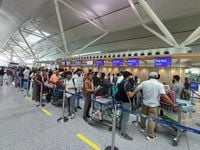In early May 2025, escalating tensions in the border regions significantly disrupted air travel, particularly affecting northern and western India. The situation intensified over the past few days, leading to retaliatory actions and heightened security concerns. As a result, the Airports Authority of India (AAI) issued Notices to Airmen (NOTAMs), leading to the temporary closure of 32 airports across northern and western India for civil flight operations. These closures are effective from May 9 to May 14, 2025, and include key airports such as Srinagar and Amritsar.
The widespread shutdowns have caused significant disruptions, with more than 430 flights canceled, affecting both domestic and international travel. Specifically, on Saturday, May 10, 2025, a total of 60 domestic flights were canceled at Delhi's Indira Gandhi International Airport (IGIA) by 3 PM IST. This included 30 domestic departures and 30 domestic arrivals, as operational adjustments continued over the evolving airspace situation linked to heightened security measures across the country.
Despite issuing a thorough travel advisory, Delhi's IGIA remains operational, but passengers are warned of possible delays as a result of tighter security and shifting airspace conditions. “Passengers are advised to check the status of their flights with airlines before heading to the airport,” stated the Delhi International Airport Ltd (DIAL). They also noted that overall airport operations remain normal, but flight schedules are subject to change due to the evolving security scenario.
The aviation sector is already struggling with the difficulties brought on by the regional strife, and these adjustments have made matters worse. International carriers have also been affected; airlines like Lufthansa and Air France have redirected flights to avoid conflict-prone airspace, resulting in longer trip durations and higher operating expenses.
Security protocols at Delhi airport and other major hubs have been tightened, with longer processing times at security checkpoints and additional deployment of personnel. Passengers are being urged to arrive well in advance of their departure times to avoid last-minute issues. The Bureau of Civil Aviation Security (BCAS) has extended the mandate of the Central Industrial Security Force (CISF) to include oversight of cargo operations and hold baggage screening. This move aims to strengthen the overall aviation security infrastructure during the current alert phase.
The cancellations come amid the broader context of increased military tensions between India and Pakistan, following recent airstrikes by Indian forces under Operation Sindoor, which targeted terror bases in Pakistan and Pakistan-occupied Kashmir. On Friday, May 9, 2025, a total of 138 flights were canceled at Delhi's IGIA due to the evolving airspace conditions.
In light of the ongoing situation, Air India announced that its flights to and from nine airports—Jammu, Srinagar, Leh, Jodhpur, Amritsar, Bhuj, Jamnagar, Chandigarh, and Rajkot—are being canceled until 5:29 AM on May 15, 2025. IndiGo and SpiceJet have also announced similar cancellations for various routes in response to the heightened security measures.
“Due to enhanced security measures and airspace adjustments, there may be delays or cancellations,” DIAL reiterated, emphasizing the need for passengers to stay informed and check flight status via their respective airlines or the official Delhi airport website. The government has extended the closure of 24 airports across the country until May 15, 2025, amid rising tensions between India and Pakistan.
As the situation remains fluid, aviation authorities are working closely with the Ministry of Civil Aviation and security agencies to ensure public safety while minimizing disruption to air travel. Passengers planning to travel during this period are advised to monitor updates from airlines and airport authorities closely. Given the dynamic nature of the situation, staying informed and prepared for potential changes is crucial.
Travelers should consult official sources, such as the websites of their particular airlines and Delhi Airport, for the most recent information. Maintaining a connection with these channels will guarantee quick and accurate updates on flight operations and security protocols. Authorities continue to assess the security landscape, and further advisories may be issued as developments unfold.
In summary, the escalating tensions between India and Pakistan have led to significant disruptions in air travel across northern and western India. While Delhi's IGIA remains operational, the impact of heightened security measures and flight cancellations is being felt throughout the aviation sector. As travelers navigate this uncertain landscape, staying informed and prepared is more important than ever.





